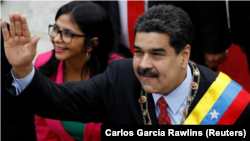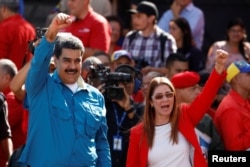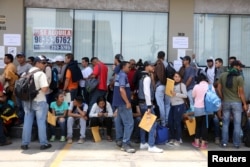Venezuela is set to hold a new presidential election by April 30, with President Nicolas Maduro seeking a second six-year term over divided opposition.
Chafing at a new round of international sanctions, the pro-Maduro Constituent Assembly unanimously approved the new election Tuesday as the ruling Socialist Party attempts to consolidate its power.
The election was scheduled to be held by the end of 2018, but some analysts had predicted Maduro would encourage an earlier vote to take advantage of opposition that has splintered in its complaints about his rule.
Not long after the assembly vote, Maduro said he would seek re-election. "I'm a humble worker," the Associated Press reported him as telling journalists at a rally. "I will accept the presidential candidacy if that's what the social and political forces of the Bolivarian revolution decide."
The rally marked 60 years since the country overthrew a military dictatorship.
Defying international sanctions
Maduro's possible re-election would flout "financial persecution and sanctions" by the United States and its allies, Vice President Tareck El Aissami said at the rally, to cheers and applause.
More foreign sanctions could be imposed. U.S. President Donald Trump has continued to put pressure on the Maduro government, which it has called an "illegitimate dictatorship" since changing the constitution to consolidate his hold on power.
U.S. State Department spokeswoman Heather Nauert was asked whether Venezuela would benefit from Maduro seeking a second term, Reuters news agency reported. "I don't think so," she said to reporters. "I don't think that that's a good idea. Certainly the people would have to decide."
The Lima Group – a bloc of at least a dozen Latin American nations that formed in 2017 to promote democracy in Venezuela – issued a statement Tuesday saying the decision would undermine a "transparent and credible" election.
"We demand that the presidential elections be convened with adequate anticipation, with the participation of all Venezuelan political actors and with all the corresponding guarantees," said Chile's foreign minister, Heraldo Munoz.
Diosdado Cabello, who is second-in-command of the ruling United Socialist Party, proposed Maduro as the party's sole candidate. Cabello had been considered a possible contender.
Maria Corina Machado, an opposition leader, described the proposed elections as "fraudulent."
"These are not elections, they are military decisions ... and under the presence of foreign irregular groups in the heart of Venezuela," Machado told Radio Caracas RCR on Tuesday.
In an interview with VOA, José Brito, a member of the opposition-led National Assembly, accused the Maduro government of chipping away at the South American country's democratic foundations.
Council to determine election date
The National Electoral Council, which must ratify the assembly's decision, is responsible for setting an election date.
The Constituent Assembly is not recognized by the United States or entities such as the European Union, which on Monday blacklisted seven more senior Venezuelan officials from doing business with its member countries. Instead, the United States, European Union and other countries support the National Assembly, the parliament that largely has been sidelined since the other assembly was formed in late summer and assumed extraordinary power.
"Before the sanctions, we call for elections," Cabello said on his Twitter account.
The sanctions are intended to pressure the Maduro government to restore democratic measures, including free and fair elections. Other goals of the sanctions are to obtain the release of political prisoners and access to humanitarian aid. Many in the country of 30 million are suffering from severe shortages of food and medicine. Others have fled the country.
Venezuela's foreign ministry touted the assembly's decision in a tweet, contending the Constituent Assembly "is absolutely constitutional, the people elected it. … Today it is again summoning the Venezuelan people to elections."
Venezuela's constitution decrees the new presidential term must begin in January 2019.
Maduro, whose popularity is around 20 percent, became president in April 2013 following the death of his predecessor and mentor, Hugo Chavez.












